“Create your own identity”
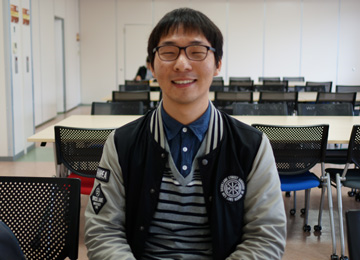
Name: Park Keun Mo
Nationality: Korean
Affiliation: HUSA Program (from Hanyang University, Department of Cultural Anthropology)
Hobbies: Reading and watching videos (movies, animation etc.), travelling
(Date of Interview: Apr. 10, 2015)
Cherry trees on campus are revealing the young leaves. Do you go cherry-blossom viewing in Korea too?
Yes, in Korea there are also many cherry trees. At my university, half of the trees on the campus are cherry trees. During the cherry-blossom season, there are many events. Families and friends gather at special places with many cherry trees and enjoy blossom viewing. In my case, I don’t like crowded places and avoid going there. Also when I travel, I prefer low season. I go out when other people work, and I work when other people go out. That’s my policy!
Oh, I see. Park san, tell me about your home town.
It’s a town in Korea called Guri, close to Seoul. The area I live in is around Seoul and Ansan. My concept of “hometown” is a little bit different to that of Japanese people. Koreans from regions other than Seoul may feel a strong love for their “hometown”. My friends from Busan are quite proud of their hometown. But I grew up in urban places like Guri or Seoul and have moved several times. So, my sense of “home” is quite weak. The place where I live currently becomes my home. Now, Hiroshima is my “hometown”.
What did you study in Korea?
My university is Hanyang University in Seoul, in the Seongdong District. Originally it was orientated towards engineering and natural sciences. But now, it is a comprehensive university which also provides humanities courses. All the same, when you hear “Hanyang University”, the image of a science college is still strong.
My major is cultural anthropology. At graduate school, I wish to study mainly in tourism culture and cultural criticism. My sub-majors are Japanese culture and Korean literature, so I also want to continue these studies. We do undergraduate studies for four years, but it feels more like “studying from a distance”. I really can’t say that I was “studying in great depth”. Therefore, I would like to touch as many fields as possible. As an undergraduate student at my home university, I have studied almost all humanity related subjects including geography, with the exception of economic courses. The first four years I have spent building on the fundamentals. Based on that, I decided to study more intensively on anthropology, which I like best.
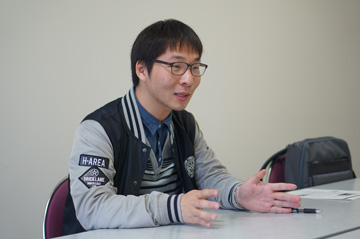
Why did you get interested in anthropology?
I don’t like science and economic subjects. So I chose humanities courses. Originally, I was interested in history and sociology, and at the beginning, I was thinking about studying history. But history - at least I think so - is a subject for people obsessed with details. That’s not what I want to do. I want to feel the general flow of history. When I was pondering about that, I happened to discover “anthropology”, a subject just between “culture” and “society” and I felt that it offers widespread studies and decided to enroll in it.
And how was the reality of anthropology?
I sometimes come near losing my identity (laugh). This study shows me completely alien and opposite worlds and I become confused.
Opposite worlds? Is Japan one of them?
Well, in a way it is. Korea and Japan have many things in common, but there are a lot of surprises I know now from daily life in Japan, - a lot I haven’t realized, when I was in Korea and was studying from books. Sometimes I think that people here are so different!
The most notable difference is human relationship. Human relationships in Korea are - to give an easy example - just like the relationship between Japanese high-school girls. The most important thing is to spend the time together, for example lunch etc. There was something surprising for me: When I said to a Japanese friend: “Shall we go eating together?” it just meant that we may go to the cafeteria now, if this person has the time. But he started to worry, and answered: “I have no time today, but how about Saturday at the “Restaurant XXXX” … at XXXX o’clock, and let me see …”. Why do things get so complicated!? I felt so much pressure.
Human relations in Korea starts from simple greetings such as “Have you had lunch?” Yes, “eating together” is the first step for strangers to become friendly. But Japanese people eat together “after” they have made friends, right? I think that Japanese people tend to create a “barrier”. Also after lessons, they take their luggage and hurry to leave. Normally you say goodbye to the person next to you, don’t you? At first I thought that they didn’t greet me just because I was a foreigner. But also among Japanese they do the same. That’s one of my realizations of how different they are!
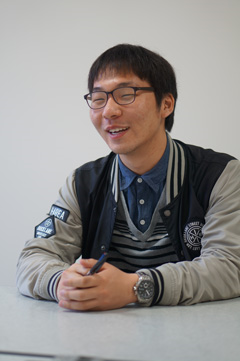
I have heard that when you eat in Korea in a restaurant, it is common that somebody pays your lunch.
That’s right. Japanese split the bill, right? In Korea, usually seniors pay. But now, I live in Japan and I follow the Japanese rules.
Why did you decide to come to Japan?
Since I was a junior high school student, I have been interested in Japan. I was always thinking about going to Japan as an exchange student after becoming a university student. When I was in my junior high, I found many interesting contents of Japanese TV dramas over the internet, and I used to buy and read novels or comics in Korean translation, for example writers such as Ryou Asai, Kotaro Isaka, Yuka Murayama or Shion Miura. At the moment, I am addicted to Kanae Minato. Further, I like Ango Sakaguchi and Osamu Dazai. I mentioned Dazai, because I can feel that he was searching for the meaning of life with all of his forces as visible in “No Longer Human” (Ningen Shikkaku) etc. I have been also interested in Korean history. In modern history, relations with Japan are very deep. For me, it was fascinating to look at this cultural crossroad from both the view of Korea and Japan. In the end, that brought me here (laugh).
You are the only child, aren’t you? Didn’t your parents feel lonely when you left for Japan?
It was my decision, so my parents weren’t against it. They said that I should do what I want to, but that I have to take responsibility for it. I often contact my mother through LINE. We have a really good relationship, but I am not a so called “mama’s boy” (laugh). Our relationship is more brotherly and sisterly than a parent-child one. My father is something like an outside observer, watching us affectionately. That’s what our family is like.
What a nice family! What was your first impression of Hiroshima?
The university is called “Hiroshima” University, so I thought that it would be in Hiroshima City. When I came to Saijo, I was surprised that my campus is located in Higashi-Hiroshima City (laugh). But it is a really rare opportunity. At night, the stars are beautiful (laugh). The environment is very different to that of a Korean university, and sometimes, I felt a little confused, but also that was a precious experience.
How about shopping and eating outside?
I usually go shopping at the nearby supermarket. But I don’t buy clothes, because I brought them from Korea. At the moment, I have nobody to date, you know (laugh), and I live only between dormitory and classroom. So I don’t care about clothes.
In Korea, there is a special coffee shop culture. Within one kilometer of my home university, there are about 20 coffee shops. Students eat and then drink a cup of coffee. The coffee shops are open until 11 p.m. Koreans become familiar by sharing food and drinks. However in Japan, building relationship is not easy even when you go eat together, because there’s no “coffee shop culture” here. So how can I find somebody to date? (laugh)
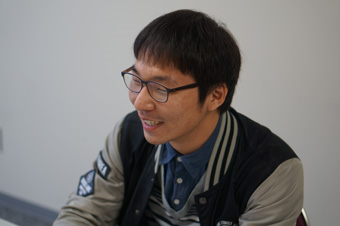
Is there something you are looking for that you can’t find in Japan?
Nothing, except for food. The “kimchi” which are sold in Japanese supermarkets, is - let me say- nothing like our original kimchi.
They are not hot enough?
The taste is not “deep” enough! In Korea, I always eat genuine, homemade kimchi with homemade taste. How can I be satisfied with kimchi in a Japanese supermarket (laugh)!? On the other hand, something I like in Japan is wasabi (horseradish)-taste snacks. I have never seen that in Korea. And “tamagokake gohan” - raw egg mixed with white rice, seasoned with soy sauce!
How about alcohol?
Yes, I drink some alcohol. When I go out with my Japanese friends, I am surprised to see how fast they get drunk. Of course, it’s different with each person. But most of my Japanese friends are weak. And it looks like they drink without knowing their bodies. I was astonished once when Japanese friends asked me to join them to an “All-you-can-drink”-pub. At first, they ordered beer, but after the second order it was strawberry milk! The third drink was orange juice! Why did they invite me to go drinking? Although it was an “All-you-can-drink” party, they almost didn’t “drink”. The Japanese people may just like the atmosphere, I think. In Korea, I get drunk relatively easily, but here in Japan,I feel like a hard drinker.
I see (laugh). At Hiroshima University, you mainly take lessons about Japanese language and culture?
Half Japanese language, half subject related lessons of my field. The Japanese of the international student designed lectures is of a completely different level compared with that of the regular lessons for HU students. When I attend lectures of my subject, anthropology, I have to express myself in Japanese. I can follow normal discussions, but it is still difficult for me to give a presentation. Compared with Korean students, who always actively say their opinions, Japanese students look quiet. Lessons are not exciting and the teachers may feel it is hard to teach. They may wish that the students become more active. At least it looks like that to me.
By the way, do you have any advice for Japanese students who want to study in Korea in future?
When you choose a university, of course, it is important to have excellent teachers, but you should also check the level of the students. I don’t want to say that scholastic standards mean everything, but studying together with bright students is as important as being taught by a good teacher. I also have to warn you that prices are higher than believed. Your wallet empties faster than you think. Furthermore, you shouldn’t expect to see the Korean-likeness you see in historical dramas, because you might be disappointed. Also in Korea, there are places with historical buildings, comparable with Takehara City in Japan, but they are quite touristy. There are many coffee chains and fast food stores for tourists, and I wonder “what is this place?”. Personally I think that this is a pity.
For travelling, I can say that Korea is a safe place. However, many Japanese visit only famous places such as Seoul, Myeongdong and TV drama locations or idols’ concerts. That’s too bad. I wish that you travel around and visit all kind of places.
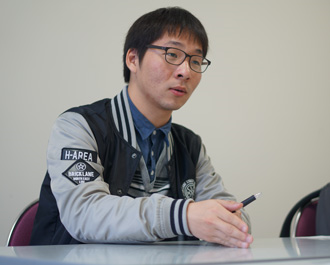
And what advice can you give Korean students who want to study in Japan?
Create your own identity! Studying abroad comes next. Because while you are studying in Japan you will adopt Japanese attitudes, and there are quite a few Korean students who become saying that Japan is better and criticizing Korea. I think that’s uncool. There may be also such people in Japan. When they visit America or Europe, they say: “When I was in …. ”. They speak negative about Japan. I don’t say that you should be prejudiced in favor of your own country. I recommend you to create your own identity first and then to study from a neutral viewpoint. Don’t like everything because you like Japan, and don’t dislike everything for the opposite reason. You should have your own opinion and be able to say: “I like that country, but I don’t agree in this point etc." Then you are ready for studying abroad. That’s not so easy, you know.
Finally, please tell me your future goal.
Well, I can’t imagine becoming a company worker who is commuting in crowded trains early every morning. I prefer to continue research in my subject or to have my own company. As I told you before, it is my non-negotiable policy to take free when other people work and to work, when other people take free. That’s impossible for an employee, but I can do it when I am my own boss. I would like to establish a tourist consulting office. I don’t have to invest a lot of money. An office, a PC and a desk would be enough. My plan is to establish a company in Japan, to become successful and then, to go back to Korea. In Addition, my aim as an international student is to write at least one thesis of cultural criticism in Japanese and to complete my curriculum.
Thank you very much. Do you have any other comments?
Life is beautiful! I want to enjoy my time as an international student up to the end and have no regrets!
Photo Gallery

Bamboo Lights Festival (Takehara City)
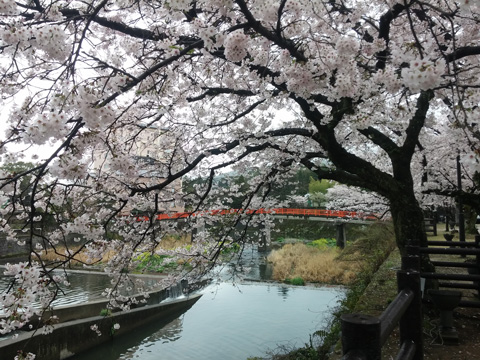
Ureshino Hot Spring (Saga Prefecture)
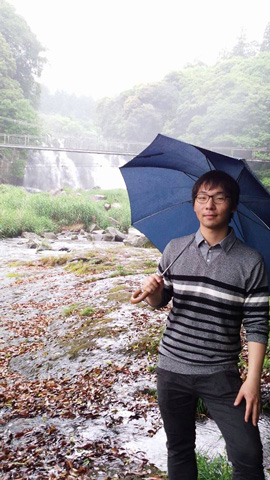
Miyakonojo City (Miyazaki Prefecture)


 Home
Home